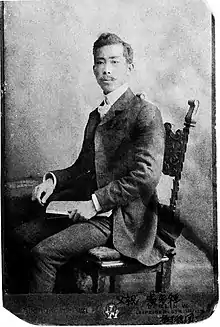Bin Bucheng
Bin Bucheng (simplified Chinese: 宾步程; traditional Chinese: 賓步程; pinyin: Bīn Bùchéng; 12 January 1880 – 27 December 1943) was a Chinese politician and educator.[1] He became the president of Hunan University in 1913, and served until 1923.
Bin Bucheng | |
|---|---|
宾步程 | |
 Bin Bucheng | |
| President of Hunan Public Polytechnic School | |
| In office 1913–1925 | |
| Preceded by | Liu Zongxiang |
| Succeeded by | Fu Dingyi |
| Personal details | |
| Born | Bin Xiaocong January 12, 1880 Dong'an County, Hunan, Qing Empire |
| Died | December 27, 1943 (aged 63) Changsha, Hunan, Republic of China |
| Political party | Tongmenghui |
| Alma mater | Technical University of Berlin |
Names
His style name was Min'gai (敏陔), and his art name was Yilu (艺庐).[1]
Biography
Bin was born Bin Xiaocong (Chinese: 宾孝聪) in Dong'an County, Hunan, on January 12, 1880, during the Qing Empire.[1] He attended Lianghu Academy (Chinese: 两湖书院) and Jiangbin School (Chinese: 将弁学堂).[1] In 1900, the Qing government sent him to Germany to study at Technical University of Berlin, majoring in mechanical engineering.[1][2] He joined the Tongmenghui when he was in Berlin.[1]
He returned to China in 1908, he worked as an engineer at Guangdong-Hubei Railway Bureau, and later became the factory director of Jinling Arsenal. In 1913, he was appointed as president of Hunan University, and held that office until 1923.[1] Hunan University's motto, "Seeking Truth from Facts and Daring to be Pioneers" (Chinese: 实事求是敢为人先), was founded by Bin Bucheng.[3][4]
He founded Pili Pao (Chinese: 霹雳报) in 1932. In January 1938, he served as president of Guomin Daily (Chinese: 国民日报).[1]
During the Second Sino-Japanese War, he was a member of the Hunan government and the director of Hunan Refugee Relief Agency.[1]
He founded Seventh Hunan Provincial High School and Mingxian Girls' School in 1942.[1]
On December 27, 1943, he died of illness in Changsha, Hunan.[1]
References
- "Bin Bucheng". Dong'an government (in Chinese). 2007-04-11. Archived from the original on 2015-06-19. Retrieved 2015-04-26.
- 实事求是 兴学经世——阮元倡导实学对清代科技文化教育的影响. Yangzhou News (in Chinese). 2015-01-22. Archived from the original on 2016-03-04. Retrieved 2015-04-26.
- Yang Shengyun (2015-03-19). 那朴实无华的四个字. Huaxia.com (in Chinese).
- “实事求是敢为人先”——湖南大学的校训故事. Xinhua News (in Chinese). 2014-07-14.